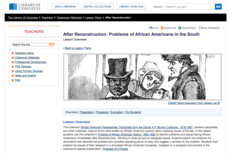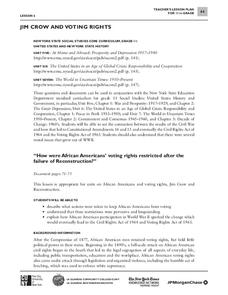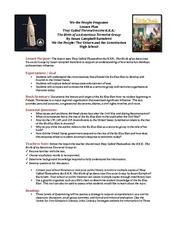Facing History and Ourselves
The Legacies of Reconstruction
The final lesson in the seven-resource Reconstruction Era collection examines the legacies of Reconstruction. Class members investigate why the period has been called an "unfinished revolution," "a splendid failure," and "the second...
Curated OER
Create a Magic Lantern Show; Freed People in the Reconstruction South
Engage your scholars by having them create "magic lantern shows" inspired by the film Dr. Toer's Amazing Magic Lantern Show: A Different View of Emancipation. As they study the South's Reconstruction through primary sources, learners...
Center for History and New Media
A Look at Virginians During Reconstruction, 1865-1877
The transition between rebellion to reunification was not smooth after the Civil War. Young historians compare primary and secondary source documents in a study of the Reconstruction era in Virginia, noting the rights that were not...
Carolina K-12
African Americans in the United States Congress During Reconstruction
The Civil Rights Act of 1866, which granted citizenship to all males in the U.S., resulted in the first African Americans to be elected to Congress. Class members research 11 of these men, the challenges they faced, and craft...
C3 Teachers
African American Voices and Reconstruction: What Does It Take To Secure Equality?
High schoolers research the 13th, 14th, and 15th Amendments, as well as other primary source documents, to determine Reconstruction's impact on the North and South. The 34-page inquiry-based lesson includes a staging question and...
Middle Tennessee State University
Fights, Freedom, and Fraud: Voting Rights in the Reconstruction Era
As part of a study of post Civil War era, young historians investigate the changes in voting rights during the Reconstruction Era (1863-1876), the fraud involved in the Hayes-Tilden presidential election of 1876, and efforts by Pap...
Annenberg Foundation
Reconstructing a Nation
Think back to the aftermath of an family dispute. The awkwardness of having to make up, get along, and move forward can be very difficult. The tenth lesson of a 22-part series on American history examines the Reconstruction Era following...
K20 LEARN
Reconstruction Treaties Of 1866: The Reconstruction In Indian Territory
The Reconstruction Treaties of 1866 and their impact on the Five Tribes in the United States Civil War are the focus of a lesson plan that asks young historians to consider how these treaties affected tribal sovereignty. Class members do...
Library of Congress
After Reconstruction: Problems of African Americans in the South
Lynchings, race riots, and Jim Crow laws were just a few examples of antagonism that African Americans faced after Emancipation. Class groups investigate these and other events, and prepare a presentation to inform the class about the...
PBS
Amid Rising Economic Inequality, Does America Need a Third Reconstruction?
Young political scientists investigate the Poor People's Campaign protest held in Washington, D.C., on June 18, 2022. They research how the event was reported in various news outlets and consider their stance on whether "poverty is...
US House of Representatives
“‘The Negroes’ Temporary Farewell,” Jim Crow and the Exclusion of African Americans from Congress, 1887–1929
New ReviewDespite some advances made during the Reconstruction Era following the Civil War, the period from 1887 through 1929, African Americans serving in Congress suffered severe setbacks due to Jim Crow Laws and voter suppression. Class members...
Core Knowledge Foundation
The Civil War
A unit covers many aspects of the Civil War. Over six weeks, fifth graders delve deep into the history of slavery, the Civil War—before, during, and after—Abraham Lincoln, women's contributions, the Emancipation Proclamation, and...
Library of Virginia
Life as a Liberated People
Imagine having no control over your life and then suddenly having to provide for yourself. Such was the challenge faced by many American slaves after emancipation. Class members are asked to consider these challenges are they examine...
City University of New York
Jim Crow and Voting Rights
Class groups examine primary source documents to determine how the voting rights of African Americans were restricted after the failure of Reconstruction, and how African American participation in World War II lead to change.
Center for Instruction, Technology, & Innovation
Did African American Lives Improve After Slavery?
The Civil War made slavery illegal, but all ex-slaves were not totally free. Scholars visit eight different classroom stations to uncover life during the Reconstruction Era in America. Groups discover items such as Black Codes, 13th,...
Carolina K-12
Plessy v. Ferguson & the Roots of Segregation
How far in the past do the roots of Jim Crow and segregation extend? Young historians closely consider this question using detailed PowerPoint slides as a basis for discussion rather than lecture, culminating in an activity where class...
Curated OER
The Called Themselves the K.K.K.; The Birth of an American Terrorist Group
How did Ku Klux Klan develop and flourish in the US? How did the government respond to acts of terrorism conducted by the KKK following the Civil War? How does the government respond to acts of terrorism today? This resource launches a...
Facing History and Ourselves
Violence and Backlash
Revolution and counterrevolution. Protest and counter-protest. Collaborators and bystanders. The focus of the fifth resource in the Reconstruction Era and Fragility of Democracy series is on the political violence that followed Radical...
Miama-Dade County Public Schools
African Americans and the Civil War
The American Civil War is the theme of this packet of materials prepared for Black History Month. Class members learn about the roles that African Americans played during the Civil War and examine the African-American experience after...
Center for History and New Media
Founding of the Laurel Grove School and Other "Colored" Schools in Fairfax County, 1860–1890
The right to public education was not always so clear in American history. Readers study several primary and secondary source documents, including property deeds, maps, and photographs, about the founding of local schools during the...
National Constitution Center
Voting Rights since the Fifteenth Amendment
What does it mean to have the right to vote? To what extent have interpretations of the Fifteenth Amendment changed over time? Young historians examine and analyze primary source documents, an interactive website, and historical analysis...
Facing History and Ourselves
A Contested History
Memories of and interpretations of history change—that's the key takeaway from a lesson that has young historians compare the story of the Reconstruction Era as told by the historians of the Dunning School to the view of scholars today...
Facing History and Ourselves
Interracial Democracy
Radical Reconstruction, the 10-year period referred to after Congress passed the Reconstruction Act of 1867, saw the establishment of manhood suffrage, men voting without any racial qualifications. Southern states also rewrote their...
Facing History and Ourselves
Defining Freedom
The Emancipation Proclamation freed slaves in the Confederate states. The Thirteenth Amendment banned slavery in the United States. However, neither document defined freedom. The second instructional activity in the Reconstruction Era...
Other popular searches
- Civil War Reconstruction
- United States Reconstruction
- Reconstruction Era
- Civil War and Reconstruction
- Reconstruction Amendments
- Reconstruction Period
- Civil War, Reconstruction
- Reconstruction of the South
- Reconstruction and Blacks
- Facial Reconstruction
- Reconstruction Black Codes
- Jim Crow Laws Reconstruction

























